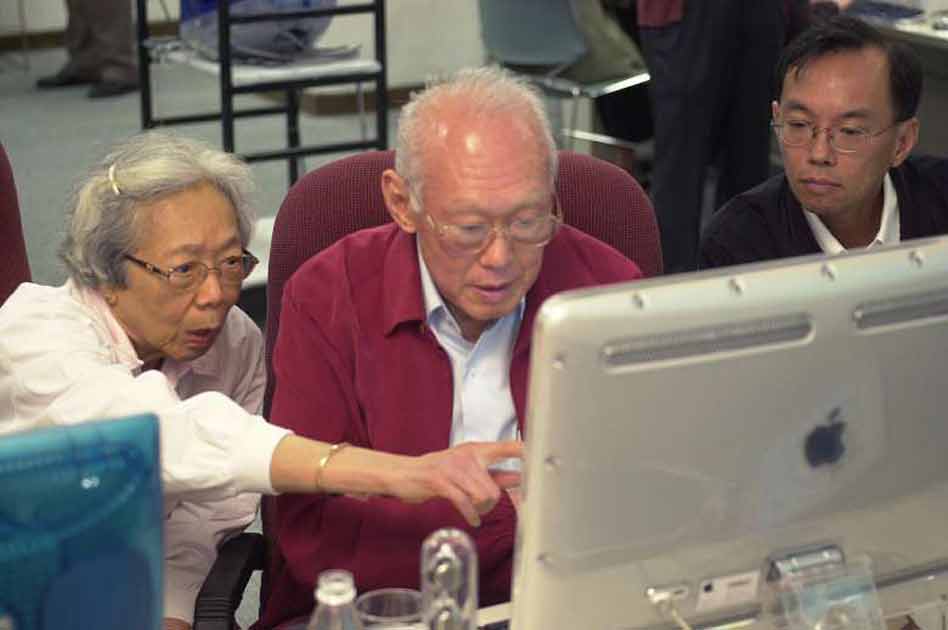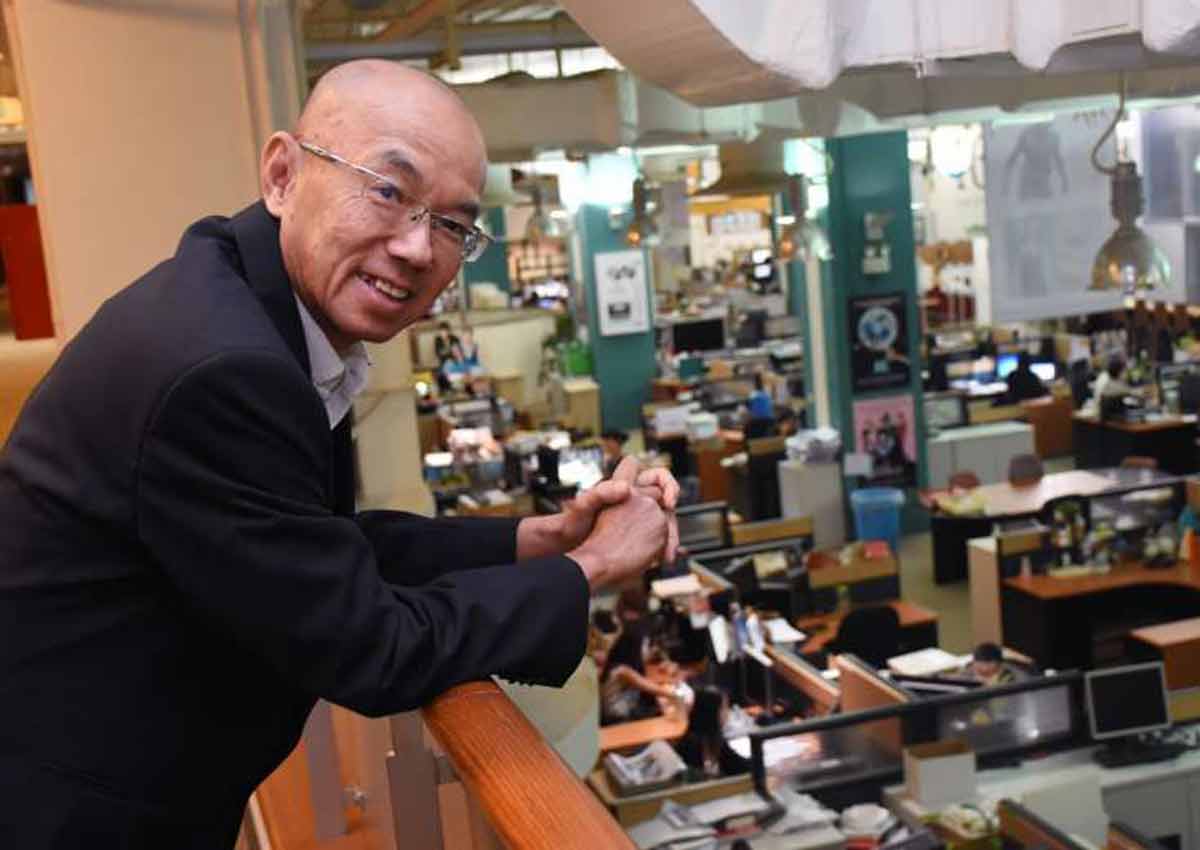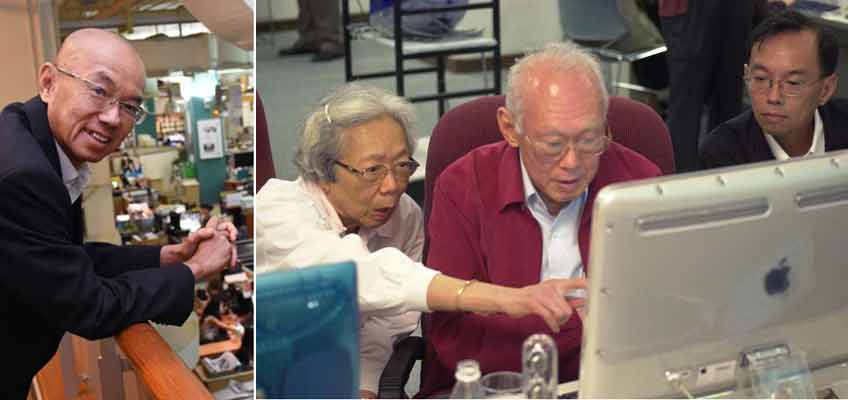On his first working day at The Straits Times on Feb 20, 1989, Mr Han Fook Kwang did not even have a table to write at.
“It was a big change,” recalls the former civil servant who, as an Administrative Service officer, had his own room and personal assistant at the Ministry of Communications, with its no-nonsense, hands-on Permanent Secretary Sim Kee Boon as his mentor.
After that unsettling start as ST’s senior leader and feature writer, his bosses – Singapore Press Holdings executive chairman Lim Kim San and editor-in-chief Cheong Yip Seng – chose Mr Han, “for some strange reason” he says, to collaborate with founding Prime Minister Lee Kuan Yew on his first book, Lee Kuan Yew: The Man And His Ideas.
That book, which he wrote with his colleagues Warren Fernandez and Sumiko Tan – who are now ST’s editor and deputy editor, respectively – became a best-seller, with close to 100,000 copies sold since its launch in 1998.
In January 1995, while writing the book, Mr Han became the paper’s political editor.
Then in September 2002, he was made its editor, a position he held until Valentine’s Day 2012, when he went on to be managing editor.
That year, after a 10-year hiatus, he returned to column-writing on “hard questions” that mattered to everyone here, such as how Singapore could continue to be successful amid rapid, roiling change everywhere.
The flood of e-mail he got from readers after what he penned in 2012 – much more than he ever got when he first wrote his Thinking Aloud columns in 1989 – spurred him to write every other week.
Four years later, he is still at it, a probing, pellucid voice of the Singapore conscience.
On May 27, he turned 63 and was to have retired from the paper. But he accepted ST’s offer to stay on as its Editor-at-Large, albeit one free to pursue his own projects.
His new book, Singapore In Transition: Hope, Anxiety And Question Marks, is out in bookstores.
It comprises 40 of the columns he likes best, plus fresh pieces written to introduce each of the book’s sections, that is, on politics, the economy, society, transport and what he calls “odds and ends”.
Among these odds and ends is a call close to his heart: the need for Singaporeans to strengthen their sense of community, be it looking out for one another or keeping everywhere clean.
“This is how developed societies get to where they are today,” he notes in this interview.
“In places like Western Europe, they are not afraid to tell you off if you don’t behave properly and show you are a responsible member of the community.”
That, he adds, is how these societies “move up and become the advanced societies that they are”.
But in Singapore, he argues, free market forces “pull people apart” because some move up the economic ladder at the expense of others, resulting in “a tendency to be smug and complacent, to feel that we have done it and are so much better than many other societies”.
But you need only look at the abandoned meal trays cluttering tables at hawker centres to know that that is not the case, he says.
Unlike people with a sense of community, he points out, “the fellow who’s waiting for a table here won’t say, ‘Hey, why are you leaving all this mess on the table?’ “
Looking out for others has to start in school, during a child’s formative years, he adds.
He was, for instance, “absolutely floored” recently by a video of schoolchildren in Saitama, Japan, on their hands and knees, scrubbing various areas in their school.
You can watch it on https:// www.youtube.com/watch?v=hL5mKE4e4uU.
In a note to Mr Han, Deputy Prime Minister Tharman Shanmugaratnam wrote: “I agree with you that it’s this culture, the everyday interactions and quality of relationships, starting from when kids are growing up, that’s at the heart of the future we want – the mastery of skills, and deep solidarity among Singaporeans.”
Mr Vincent Loo, 57, a commodities sales and relationship manager at financial news and data provider Bloomberg, who has been following Mr Han’s writing since his first Thinking Aloud columns, says: “His writing has touched a lot of raw nerves here, which is good because he is not about criticism for criticism’s sake. Most of the time, he puts a positive spin on his constructive criticism, which shows us what mature thinking is like.”
THAT’S OUR KARMA
Mr Han grew up without a television set in his home, and his first articles for ST in 1989 ran in a newspaper that was all black-and-white, as colour pages were introduced only a few years later.
But by the time he became its editor in late 2002, very powerful political, social and technological forces were conspiring to do in newspapers and, in many cases in the United States, did.
With a far more vocal populace here, and the media scene changed forever by technology in split seconds, he recalls: “Although we tried very hard to produce the best paper we could every day, it didn’t satisfy everybody. And I would be the first to admit that that was the case.
“In a way, it’s not surprising. Society is changing very fast. Different people have different expectations of a newspaper.”
Tapping away at the leg of the coffee table in his office, as he often does when he is pondering something, he muses: “One of the challenges of being an editor is that it’s unlike producing a bottle of Coke, where once you get the formula you don’t need to tweak it.”
“There were areas we fell short. We could have done better,” he then says, declining to cite examples.
Asked what he thought of the view that ST reflects the Government’s position, he says evenly: “That’s our karma. That’s part and parcel of who we are. It doesn’t mean that we can’t be professional and credible and produce a good paper for our readers. But it’s a perception that will be very hard to shake off, given our history and the strong influence the Government has.”
As to navigating that strong influence, he says: “Every editor in ST has had to navigate this, including the present editor. I did my best navigating it; I will leave it to others to judge how well I did that.”
With local opposition political parties given greater coverage on his watch than ever, did speaking truth to the powers that be dent his career advancement?
“Well,” he says wryly, “I was already editor of the paper.”
He adds: “You have to decide for yourself how you want to do it for the paper. You have to be very sensitive, but you can’t always be looking over your shoulder and be afraid of the consequences if you did it one way or another. You have to trust your judgment and you take counsel from your senior editors.
“You have to approach it as professionally as possible, and if you don’t do it this way, you’re going to lose the readers or put the paper in an untenable position and you’re not just going to lose your readers but lose the respect of your colleagues in the newsroom.”
KOPITIAM KIA
Mr Han is married to public relations consultant-turned-homemaker Frances Chua, and they have a son, Isaac, and two daughters, Yushan and Yushi.
Mild-mannered, kindly even, he insists he is “a very simple person” with “very simple interests” such as reading a good novel.
At present, he is leafing through Walden by Henry Thoreau and Malgudi Days by R. K. Narayan.
He grew up in his paternal grandfather Han Keng Juan’s coffee shop in Joo Chiat Road, with his then five-member family squeezed into a room upstairs, all sleeping on the floor. Across the road was Joo Chiat Community Centre, which had a little library.
Mr Han recalls his father, textile salesman Han Eng Min, “kicking up a big fuss” because librarians there would not issue his son a library card at first, as he was only four.
After Presbyterian Boys’ School and Raffles Institution, where he edited its self-funding magazine, the Rafflesian Times, Mr Han left Singapore for the first time for the “perpetually grey skies” of Leeds, Britain, on a Colombo Plan Scholarship.
He returned with a mechanical engineering degree in 1975, did his national service with the Republic of Singapore Air Force, and then joined the Economic Development Board (EDB) in 1978, having decided that he wanted nothing to do with engineering.
While at EDB, he learnt that the Government was short of Administrative Service officers, so he signed up to become one and spent the next nine years crafting policies to back the introduction of the MRT and ERP systems. He also obtained his master’s degree in public administration from Harvard University’s Kennedy School of Government.
ST offered him a job after being suitably impressed with his replies to readers on its Forum page.
With his foot tapping away at the coffee table, one of two tables in his room, he says: “Sometimes, I come across as critical of the way we do things and all that. But that’s my little contribution to this attitude which I think the Old Guard leadership had, which was to confront our problems openly and honestly, and where we fall short, to say so.”

What it was like to work with Mr Lee
In his new book Singapore In Transition: Hope, Anxiety And Question Marks, ST’s Editor-at-Large Han Fook Kwang recalls what working with the late Mr Lee Kuan Yew was like:
“Once he had decided to do something, whether it was writing a book or securing Singapore’s future, he was impossible to shake off.
“When he called me one night in August 2008 to do another book, I wasn’t thrilled at the prospect. I was then the editor of The Straits Times, with my hands full running the paper. The editor’s job was demanding, the hours long, and I did not relish doing another book on top of that.
“But it was impossible to say no after he said he had only two to three years left and he wanted to put across his views on some of the issues that troubled him: the call for more political openness, the backlash against foreigners and the challenges facing Singapore in a rapidly changing world.
“Given his failing health, it might well be his last book. When I took some time to get back to him on the concept of the book, he urged haste, telling me in an e-mail: ‘Don’t let the grass grow under your feet.’
“Finally, when we had settled on how the book should be done, he was impatient to start, and wrote: ‘Try it the way you propose. Outline the subjects to be covered and draft a few chapters. Then, let’s try your vigorous probing and challenging of my positions.’
“The book, Hard Truths To Keep Singapore Going, was two years in the making. When we finally launched it in 2011, his health had deteriorated significantly after the death of his wife.
“Indeed, he loomed large in my professional life.”
• Singapore In Transition: Hope, Anxiety And Question Marks by Han Fook Kwang is available at $25 with GST at leading bookstores. Meet Mr Han at noon today, when he talks about his new book at the first-ever Singapore Coffee Festival, in the ST Reading Room, Level 3 Food & Drinks Zone, F1 Pit Building.

This article was first published on June 12, 2016.
Get a copy of The Straits Times or go to straitstimes.com for more stories.







